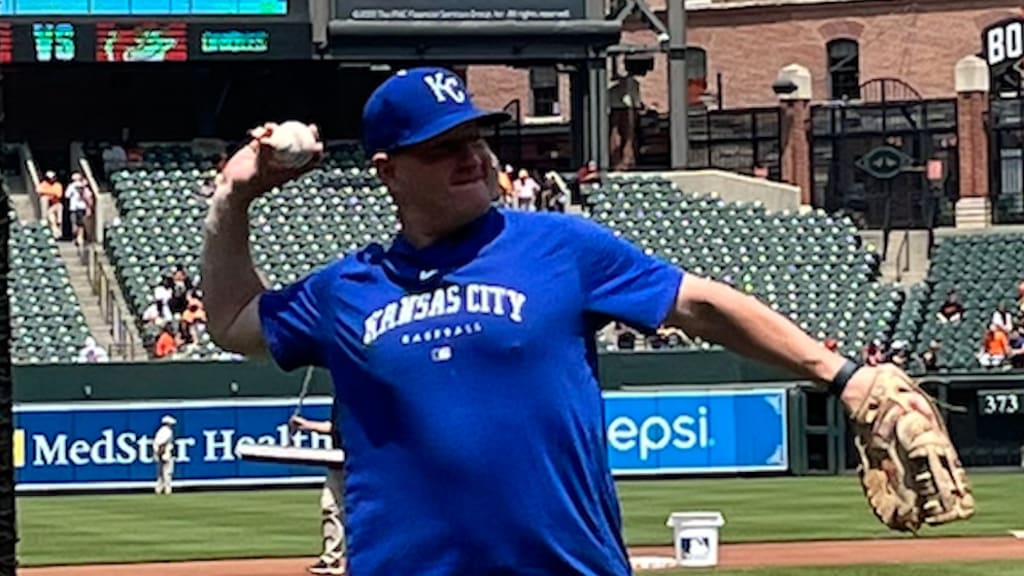
This story was excerpted from Anne Rogers’ Royals Beat newsletter. To read the full newsletter, click here. And subscribe to get it regularly in your inbox.
KANSAS CITY -- When Bill Duplissea sees a close play, it’s go time.
The Royals’ replay coordinator has 15 seconds to decide whether the team should challenge a play, and there are plenty of moving parts -- from operating monitors with up to 16 camera angles to communicating what he sees with the coaching staff. By the time you’re done reading this paragraph, he has to be ready to make the call: To challenge or not to challenge?
“With each pitch, I’m reminding myself of the inning, the outs, the batting order,” Duplissea said. “Nowadays, it’s just kind of robotic. At the beginning, I was tense the entire game. Now, I’m a little more relaxed. It’s really evolved.”
Duplissea never thought he would be in a video room, but the man known as ‘Dup’ (rhymes with doop) or ‘Duper’ in the clubhouse has turned into one of the best in the replay business.
After his playing career stalled in Double-A with the Dodgers’ organization in 2003, Duplissea coached junior college ball. When his godfather, Bob McClure, was hired as the Royals’ pitching coach, Duplissea joined the staff as a bullpen catcher in 2006 and added advance scouting duties in 2009.
The addition of replay brought more responsibilities in 2014, when former manager Ned Yost instructed Duplissea to take over this new part of the game. It was a transition Duplissea initially didn’t want, given that he had always been in uniform.
“It turned out to be a blessing,” said the 45-year-old Duplissea, who also still helps with some advanced scouting.
The technology continues to change and Duplissea’s role has evolved, but over the years, he’s developed a process and strategy for each replay, backed by the organization. And he has a reputation for success. From 2014-22, the Royals’ 65.7% overturn rate leads all of baseball, ahead of the Yankees’ 63.7%, according to data released to clubs; their 27 calls confirmed lead baseball, and their 207 calls overturned rank second.
“You’ve got to be able to make a decision and live with it,” Duplissea said. “What makes a good replay guy is knowing what it takes for New York to overturn it. Not what I think. You want our guy to be safe. But if you don’t have the evidence, and if you don’t know what it takes to get a call overturned, you don’t stand a chance.”
Duplissea receives an email with challenges that happened the day before and watches every one about 20 minutes before the Royals’ game to get his mind ready.
“I feel like I have a really good idea of what it takes for a call to be overturned, what you need to show,” Duplissea said. “That helps with strategy. Even if it’s going to be a ‘stands’ call -- not enough to overturn -- I’m still not going to challenge it in the second inning and lose our challenge if we know the decision that New York is going to make.”
This season has been different as Duplissea adjusts to the 15-second rule and learns a new manager and coaching staff. Manager Matt Quatraro, who said he knew the Royals had a good reputation for replays when he was with Cleveland from 2014-17, is apt to challenge more in the late innings even if Duplissea isn’t certain it’ll be overturned.
“Ninety-nine percent of the time, we go with what he says,” Quatraro said. “We’ve had a couple this year where we’ve gotten to the seventh or eighth -- and [assistant general manager] Scott Sharp has brought this up in conversations we’ve had -- and we challenge because of the leverage of the game, the magnitude of the situation.”
According to internal statistics released to teams Wednesday, the Royals have a 58.3% overturn rate this season, which is the ninth highest in baseball, but have only challenged a play 12 times, which is the fifth-fewest.
The process starts before a play is over. If Bobby Witt Jr. is running out a ground ball or stealing a bag, Duplissea knows he might be needed, given the shortstop’s speed. In the fourth inning on June 3 against the Rockies, Witt hit a soft chopper to first base, with reliever Matt Carasiti just barely beating Witt to the bag. Quatraro immediately held up his hand to check for a potential challenge.
When these plays happen, Duplissea, stationed in front of three monitors, immediately hits pause on the live game stream. Now, he’s relying on Royals video coordinator Ethan Blouin to relay anything that’s happening on the field -- what the call was and how players react.
“I like to know if the player is motioning for a challenge,” Duplissea said. “That sets off an alarm. Except for Alcides Escobar. He always thought it should be challenged. After like the 10th time, I’m like, 'He’s never right.’”
On the Witt play, Duplissea’s best angle is one of four high-definition cameras. He double-clicks one showing a low angle of first base, and it goes full-screen on Duplissea’s left monitor.
“Now I can back things up really slowly, frame by frame,” he says. “I can see when his foot hits the bag. By this time, I’m on the phone. There’s usually a clock in my head, I know once I pause it, within three seconds it’s going to ring.”
When Duplissea answers, bench coach Paul Hoover reiterates the call on the field.
“Hang with me,” Duplissea tells Hoover. When Duplissea determines the call was right, that Witt was out at first base, he tells Hoover: “Out at first base. Out at first base.”
Hoover relays the information to Quatraro, who signals that play should continue.
If Duplissea thinks the Royals should challenge, he’ll say, “I think we’ve got something here.”
“Then I’ll want to confirm it with another camera angle,” Duplissea said. “Was his foot on the bag, did Bobby definitely touch the bag? If I confirm it, I’ll say, ‘Challenge the play at first base.’ Hang up the phone. Then wait.”
Reviews can feel long for Duplissea. There’s no worse feeling than when he misses a call. On May 16 in San Diego, the Royals challenged a tag play on Juan Soto’s double. Witt was adamant on the field that he had tagged Soto before he slid into second base.
“The very first angle I looked at, from low third, I don’t know if my eyes wanted to see it or what, but I thought I saw him tag him,” Duplissea said. “So I said, earlier than I should have, ‘Challenge.’ As I went to look at the second angle, I saw it. His glove was like two feet away.
“I get mortified. We lost that. And then I sit there and sweat it out until we get to the ninth inning. That’s my biggest fear, I screw up and make a bad decision, and it affects the team later in the game in a much more important situation.”
Over the years, Duplissea has earned the trust and respect of players; they know when the Royals aren’t challenging, Duplissea will have evidence.
“Even when I really do think I got the out or was safe,” infielder Nicky Lopez said with a grin.
Duplissea might be one of the most behind-the-scenes people on the Royals’ staff. But his responsibilities are not.
“It’s a really hard job,” Quatraro said. “I’m giving him 100% trust in making a call because he’s really good. If you’re not sure of their consistency, it can be really hard. Thankfully, Duper’s great.”
